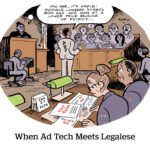During AppLovin’s Q4 earnings call earlier this week, an investor asked CEO Adam Foroughi to explain how Axon 2.0 differs from the original Axon.
Axon 2.0 is an updated version of AppLovin’s AI-powered ad tech software. It was released last year and relies on predictive machine learning to target app-install ads to the users most likely to download those apps.
Foroughi’s answer was illuminating because of how unilluminating it was.
“It’s just better,” he said, adding that the technology is built to support more scale and be more efficient and effective.
But that doesn’t tell you much about the how.
Repeat performance
Most AI-based ad buying and targeting tools aren’t known for their transparency. Some products, like Google’s Performance Max and Meta’s Advantage+ Shopping Campaigns, have become almost synonymous with black boxes.
But not all ad buyers care about what’s happening in a platform’s guts, so long as they reach their campaign goals.
“As a direct marketer, I don’t even need to know the fundamental mechanics behind it if I understand whether it works or not,” Milo McMahon, founder of Outdoor eCommerce, an agency that helps outdoor and apparel brands grow their sales online, told AdExchanger last year in reference to Advantage+.
The mobile app developers who make up AppLovin’s target market worship at the altar of campaign performance – and they don’t operate on a fixed budget. They buy on a performance basis.
Black box? Whatever
In other words, if performance marketers can prove that a tactic or platform is working, they’ll continue expanding their spending ad infinitum.
That’s why the details of what, exactly, makes Axon 2.0 better than Axon 1.0 probably don’t matter to most of AppLovin customers. Black box or no, the Axon 2.0 flywheel will keep spinning for AppLovin as long as advertisers keep seeing the value.
So far, they seem to be. In Q4, AppLovin’s software platform revenue, underpinned by its ongoing investment in Axon 2.0, was $576 million, up 88% YOY at a 73% margin.
And in its shareholder letter, AppLovin pointed to Axon 2.0 as a driver of its software platform revenue growth and said the company “saw advertisers spend more as a result of improved performance from our AI-enhanced advertising engine.”
‘We can’t see into a black box’
Foroughi drew an analogy between Axon 2.0 and the opaque yet popular ChatGPT.
Although most people don’t know exactly how the technology works, they do know ChatGPT-4 is better than ChatGPT-3.5, and when it’s released later this year, ChatGPT-5 will be better than ChatGPT-4. They know this because when they type a prompt into the chatbox, they get a “better” result.
Axon 2.0, Foroughi said, is similar.
“We can’t see into a black-box algorithm,” he said. “[But] there’s a whole bunch of predictions along the way, and Axon 2.0 makes them better than the prior version. That creates efficiency gains both for our business and that of our partners.”


















